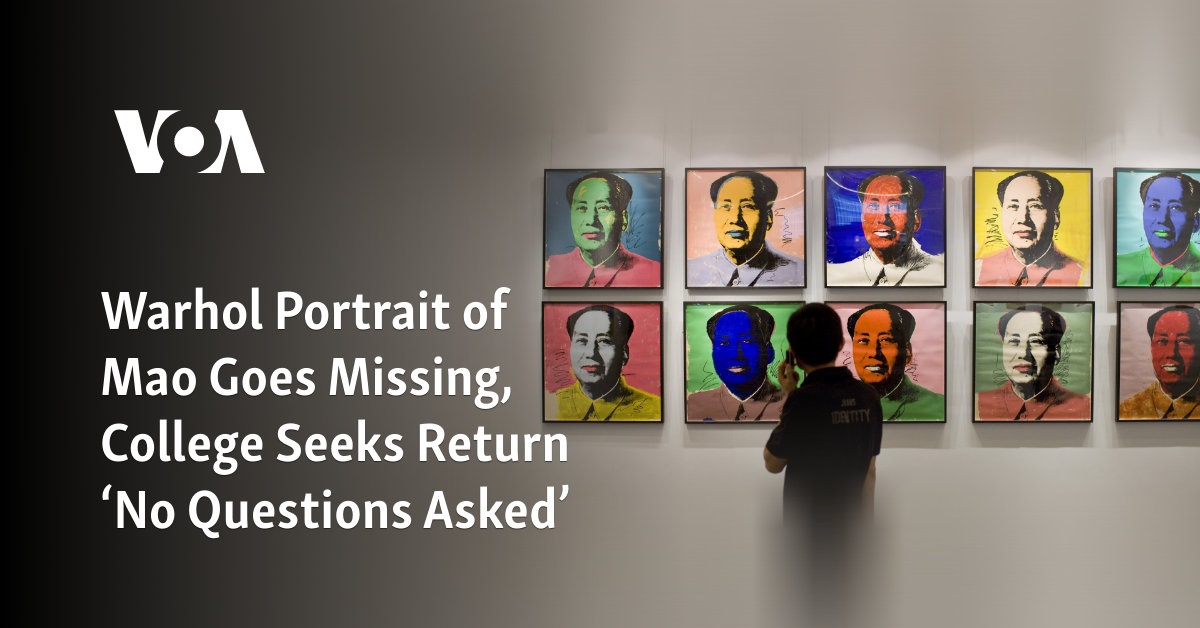
A California university is seeking the “unconditional” return of an iconic portrait of Chinese Communist Party founder Mao Zedong created by famed American artist Andy Warhol.
Two weeks ago, Orange Coast College discovered that a Warhol-signed silkscreen of Mao Zedong was missing from its vaults. The portrait is estimated at $50,000.
Doug Bennett, executive director of university advancement at Orange Coast College, told VOA’s Mandarin Service that the print was acquired from a gallery in Laguna Beach, Calif., in 1974 by someone close to the school. Purchased and donated anonymously to the school in September 2020.
But now, even before it was put on display, it was missing.
Bennett said he hopes someone takes the printout by mistake, adding that the college will not ask any questions if the printout is returned.
“Maybe someone took it and put it in their office or home and thought that was OK. Or maybe it was misplaced, but I don’t think it’s like a bunch of art thieves stole it, “He said.
Warhol created the portrait of Mao Zedong after U.S. President Richard Nixon’s historic visit to China in the 1970s.
“when it [the portrait of Mao] When it first came out in the 1970s, it was very controversial and maybe still is to some people,” Bennett said.
From 1972 to 1973, Warhol used the image of Mao Zedong in China’s widely circulated Little Red Book as a template to create five series of 199 colorful silk screen works of Mao Zedong.
On March 13, after the school discovered that the printed matter was missing, it immediately launched an internal investigation. A week later, the incident was reported to the Costa Mesa Police Department in Orange County, where the school is located. Police are investigating.
“This is a top priority for the police department and two detectives have been assigned to the case and are investigating,” Bennett said.
The Costa Mesa Police Department told VOA the investigation is ongoing but did not provide any new details.
Police and the school are appealing for anyone with information to come forward.
Warhol, known as the godfather of the Pop Art movement, began to use ubiquitous objects such as Campbell’s Soup cans and Coca-Cola bottles as creative subjects in the 1960s, kicking off the Pop Art movement.
The New York Metropolitan Museum of Art’s summary of Mao’s portraits describes the series this way: “As Warhol explained, these works depict brilliant colors and expressionist marks with their repeated images, possibly alluding to political propaganda. Similarities between. and capitalist advertising.”
In 1982, Warhol visited China and took a group photo in front of Mao Zedong’s portrait in Tiananmen Square. Five years later, Warhol died.
In 2013, Warhol’s works toured China, but the “Mao Zedong” series was forced to be withdrawn. At the time, Chinese state media claimed that Mao Zedong in the work “far exceeded the officially acceptable image.”
However, the Mao Zedong series has become one of Warhol’s most sought-after celebrity portraits by collectors. According to Sotheby’s auction house data, in 2015, a painting by Mao Zedong was sold for US$47.5 million. In 2017, another Mao Zedong painting sold for $12.7 million.
Follow us on Google news ,Twitter , and Join Whatsapp Group of thelocalreport.in












